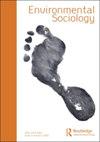受污染社区妇女集体身份形成的障碍
IF 2.8
Q3 ENVIRONMENTAL STUDIES
引用次数: 0
摘要
现有的研究强调了性别集体认同在动员妇女环境活动中的共鸣,特别是在母亲和照顾方面。但是,我们对可能阻碍共同关心环境问题的妇女群体形成集体认同的具体障碍的理解仍然存在差距。为了探究这个问题,我们探讨了北卡罗来纳州两个癌症集群的案例,许多居民怀疑这两个癌症集群与煤灰污染有关。我们对受集群影响的女性(n = 36)进行定性访谈,以确定抑制动员集体认同形成的因素。我们的研究结果表明,在这种情况下,剥夺权力和孤立之间的相互关系,以及与管理环境疾病相关的情感和护理劳动的复合负担,阻碍了集体身份的形成。这些发现强调了环境疾病案例的特殊因素如何能够预先阻止,而不是推动女性的环境行动主义。本文章由计算机程序翻译,如有差异,请以英文原文为准。
Barriers to women’s collective identity formation in contaminated communities
ABSTRACT Extant research emphasizes the resonance of gendered collective identities in mobilizing women’s environmental activism, particularly around motherhood and caregiving. Gaps remain, though, in our understanding of the specific barriers that can obstruct the formation of collective identity among groups of women who share environmental concerns. To interrogate this issue, we explore the case of two cancer clusters in North Carolina that many residents suspect are related to coal ash contamination. We use qualitative interviews with women affected by the clusters (n = 36) to identify factors that have inhibited the formation of a mobilizing collective identity. Our results suggest that the reciprocal relationship between disempowerment and isolation, as well as the compounding burdens of emotional and care labor associated with managing environmental illness, prevented the formation of a collective identity in this case. These findings highlight how factors particular to cases of environmental illness can forestall, rather than drive, women’s environmental activism.
求助全文
通过发布文献求助,成功后即可免费获取论文全文。
去求助
来源期刊

Environmental Sociology
ENVIRONMENTAL STUDIES-
CiteScore
4.60
自引率
12.00%
发文量
34
期刊介绍:
Environmental Sociology is dedicated to applying and advancing the sociological imagination in relation to a wide variety of environmental challenges, controversies and issues, at every level from the global to local, from ‘world culture’ to diverse local perspectives. As an international, peer-reviewed scholarly journal, Environmental Sociology aims to stretch the conceptual and theoretical boundaries of both environmental and mainstream sociology, to highlight the relevance of sociological research for environmental policy and management, to disseminate the results of sociological research, and to engage in productive dialogue and debate with other disciplines in the social, natural and ecological sciences. Contributions may utilize a variety of theoretical orientations including, but not restricted to: critical theory, cultural sociology, ecofeminism, ecological modernization, environmental justice, organizational sociology, political ecology, political economy, post-colonial studies, risk theory, social psychology, science and technology studies, globalization, world-systems analysis, and so on. Cross- and transdisciplinary contributions are welcome where they demonstrate a novel attempt to understand social-ecological relationships in a manner that engages with the core concerns of sociology in social relationships, institutions, practices and processes. All methodological approaches in the environmental social sciences – qualitative, quantitative, integrative, spatial, policy analysis, etc. – are welcomed. Environmental Sociology welcomes high-quality submissions from scholars around the world.
 求助内容:
求助内容: 应助结果提醒方式:
应助结果提醒方式:


